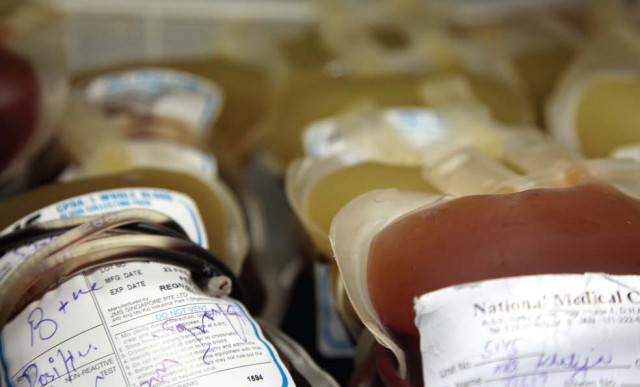Staying safe: Summer and monsoon seasons considered peak time for A and E cases
World Hepatitis Day marked by free screenings and vaccinations.

“Jamila Khatoon, your turn is next,” called out Fehmida, a nurse working at the Sindh Institute of Urology and Transplantation (SIUT). Within a few seconds, the 74-year-old lady was being pushed on a wheelchair by her son into the screening laboratory after waiting for over an hour for her turn. Jamila was one of over 500 patients who capitalised on the free hepatitis screening, vaccination and blood pressure check-up at the institute to mark the World Health Organisation endorsed Hepatitis Day on Thursday.
“If it weren’t for this free screening session, I probably would not have been able to afford being checked up and vaccinated,” Jamila told The Express Tribune. The elderly woman lost her daughter when she was barely seven years old as she did not have the resources to have her treated.
Within the same hall, gastroenterologist Dr Adeel Rehman conducted a brief presentation on the preventative methods of the dangerous virus. “One out of every 12 people here today will be suffering from the disease,” he said, adding that of the five strains of the virus (hepatitis A, B, C, D and E), B and C affected 7.5% of the overall Pakistani population.
Elsewhere, speaking at a seminar organised by the Aga Khan University Hospital (AKUH), consultant gastroenterologist Dr Wasim Jafri said types B and C, which account for 78% of liver cancer cases, are considered the most dangerous. Viruses A and E are due to consumption of contaminated food or water whereas D is “the strangest of the five viruses as it requires the person to first be infected with the type B virus to cause an infection.” The virus’s spread largely as a result of the careless attitude of healthcare professionals who do not use sterilised syringes and untainted blood. Hospitals are equally responsible for not disposing off their waste properly.
Hepatitis is a problem more common than many of us would like to accept. It takes around two million lives in the country every year. People need to be extra cautious during the summer and monsoon seasons as this is considered peak time for A and E cases, advised consultant gastroenterologist at AKUH, Dr Rustam Khan. While these infections subside after a few weeks, pregnant women may suffer acute cases of hepatitis E which can sometimes prove fatal.
One simple measure is to insist on properly sterilised syringes and surgical instruments, avoid sexual contact with people known to carry the virus and ensure that blood and blood products have been properly screened. In the case of hepatitis A and E, preventive measures included drinking boiled water and washing your hands properly after using the toilet.
Consultant microbiologist at AKUH, Dr Erum Khan, said that a number of tests such as those for liver function, good sensitivity serological tests and advanced technology tests like the polymerase chain reaction are essential in diagnosing the disease as well as monitoring the response to treatment. Experts strongly urged early diagnosis and treatment to avoid being administered medication later which may have significant side effects.
Keeping in mind people who may not be able to afford costly tests and treatments, the Dow University of Health Sciences has set up a National Institute of Liver and Gastrointestinal Diseases at its Ojha Campus. The indoor and outdoor treatment facilities - including intensive care treatment and endoscopy - are offered at reduced charges.
Published in The Express Tribune, July 29th, 2011.


















COMMENTS
Comments are moderated and generally will be posted if they are on-topic and not abusive.
For more information, please see our Comments FAQ